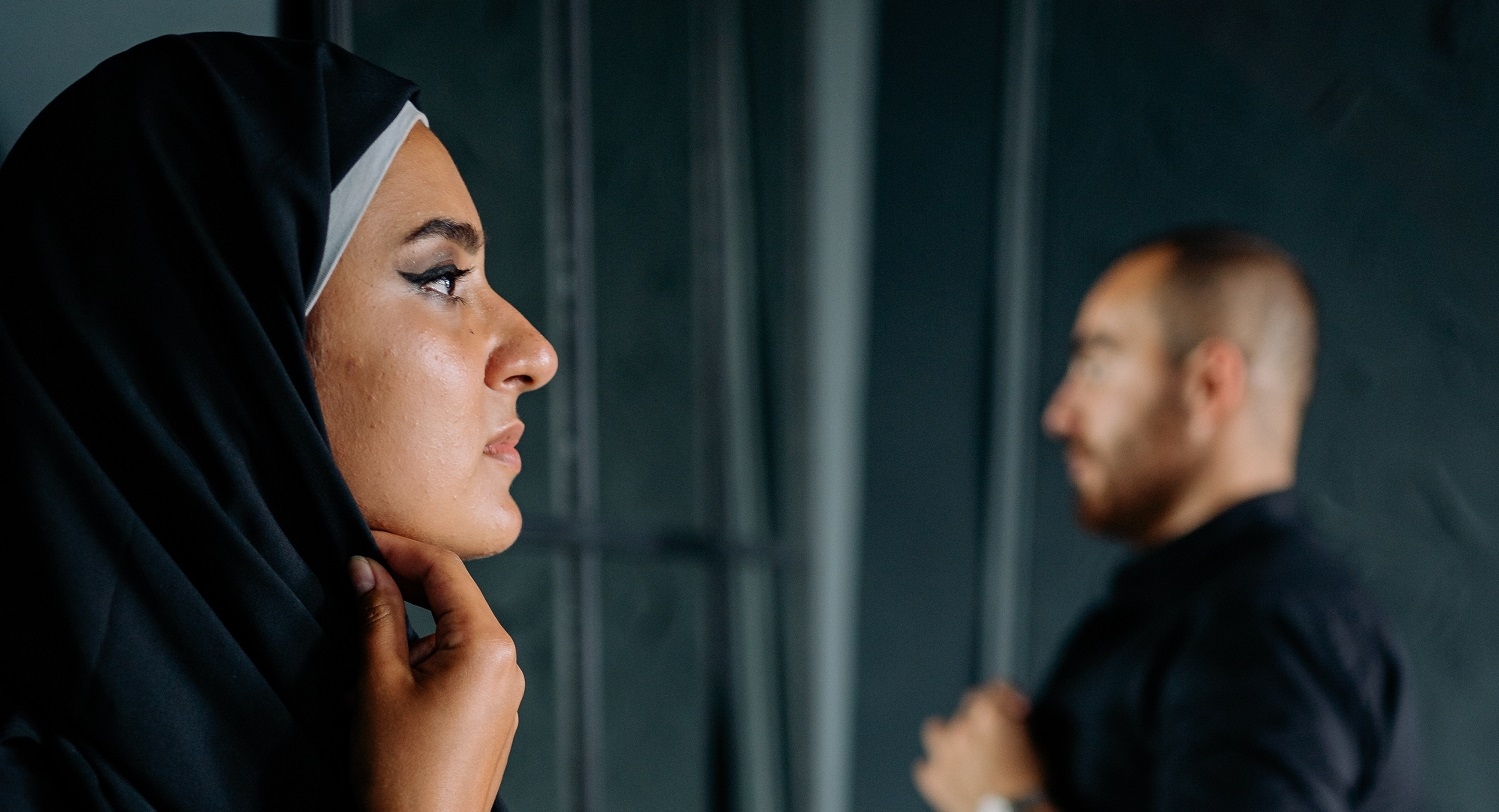Forgiveness & Healing: A Guide for Domestic Violence Survivors in the Islamic Context
Faith
|
Nov 7, 2023
|
8 MIN READ

Image source: Pexels
Forgiveness is often seen as a noble act, a gesture of kindness and maturity. Yet, for survivors of domestic violence, the concept becomes complicated and emotionally charged, especially if you want to approach it through a faith-based lens. Islamic teachings place a high value on forgiveness; in fact, DV survivors are often encouraged to forgive their abuser more often than not.
But what does the Quran and hadith say? How should survivors approach forgiveness when they are constantly pressured by society, sometimes even by their abusers?
What Does the Quran and Hadith Say About Forgiveness?
The Quran discusses forgiveness and mercy in great detail. One of the most frequently quoted verses is: “And if you punish, then punish with the like of that which you were afflicted; but if you endure patiently, verily it is better for those who are patient.” [16:126] This verse emphasizes that retaliation should not exceed what was inflicted upon a person by another. It also encourages patience and compassion in response to suffering rather than revenge or retribution.
This same sentiment can be found throughout other hadith. For example, our Prophet Muhammad (saw) said, “Whoever pardons and makes reconciliation – his reward is due from Allah.” [Muslim] Our Prophet also taught us to treat others kindly no matter how they treated us – even our enemies. So, he could have been referring to forgiving abusers when he stated: "Whoever has wronged someone else must seek their pardon before there can be any talk about God's forgiveness." [Tirmidhi]
The key point here is that we should always err on the side of compassion over revenge or punishment when dealing with difficult situations such as domestic violence. The question then becomes, what does that compassion look like, and how are we being compassionate towards ourselves as well as our abuser(s)?

Image source: Instagram
When a victim of domestic violence contemplates forgiveness, they should consider that the concept of forgiveness in Islam is about understanding its consequences and implications. It does not mean forgetting what happened or excusing it. When someone chooses to forgive an abuser, they are choosing to acknowledge that something wrong was done. What comes after that is in the hands of the DV survivor.
Victims must be sure not to suffer further harm from their actions toward forgiveness and should never endanger themselves by trying to reconcile with an abuser who has shown no signs of repentance and change. This can include making sure you have access to support networks before going ahead with any decisions related to your abusive relationship or forgiving your abuser publicly without consulting those closest to you first – such as friends, family or counselors.
It is crucial to understand that Islamic teachings also advocate for justice and protection from harm. Forgiving someone doesn't necessarily mean allowing oneself to be continuously harmed or ignoring the quest for justice.
The Pressure to Forgive
Forgiveness can be a powerful tool for healing, but it is not always the best option. Survivors may be encouraged by family, friends or even religious leaders to forgive their abusers. The abuser may also manipulate the situation, asking for forgiveness as a tactic to continue the cycle of abuse.
Survivors must understand that forgiveness is a personal decision with no “right” or “wrong” answer; they should never feel obligated to make any decisions before they are ready and have had adequate time and support to process what happened. Yes, there can be peace in being able to forgive, but that doesn’t mean you have to maintain a relationship with that person. That decision is up to the victim.
You don't have to be in a space to forgive. If you never reach that point, that's okay too. "Being in a space to forgive" refers to the emotional, psychological and sometimes even physical state where forgiveness feels like a genuine possibility. This "space" is not just a momentary lapse in pain but a sustained emotional readiness to release the resentment, hurt or anger held against the abuser.
For many survivors, reaching this state is a long, arduous journey that involves much introspection, healing, and sometimes, professional guidance. Some survivors may never arrive at this space, and that's fine.

Image source: Pexels
It's crucial to acknowledge that not being in a space to forgive is a valid emotional stance. Pressures to "move on" or "let go" often do not take into account the profound emotional and psychological toll abuse takes. They also often unintentionally trivialize the severity and impact of the trauma, reducing it to something that can be easily "forgiven" or "forgotten."
Allah (S) promotes forgiveness but also allows revenge for those wronged by another. He (S) says: “The recompense of evil is evil, the like of it. But he who forgives and makes amends, his reward lies with Allah. Surely He does not love the wrong-doers.” [Ash-Shuraa, 42:40]
And in the next ayah: “There is no blame against him who avenges himself after he has been wronged.” [Ash-Shuraa 42:41]
Allah (S), in his wisdom, leaves room to appreciate that forgiveness may be better but one may not be able to grant it. And that’s ok, too. How merciful and wise is Allah (S)?
So yes, forgiveness is encouraged and can be a beautiful thing. However, you may not be in a space to forgive for various reasons:
1. Emotional safety: You may still be processing the trauma, and any thought of forgiveness could disrupt that fragile emotional safety you've established.
2. Ongoing abuse or threat: Sometimes, the abuse is continuing, or the threat of future abuse is real, making the very idea of forgiveness not just impractical but potentially dangerous.
3. Lack of genuine remorse: For some, forgiveness requires the perpetrator to show genuine remorse. In the absence of that, forgiveness may feel like an empty exercise.
4. Personal readiness: Even if all external factors seem to encourage forgiveness, you may personally not feel ready. This could be due to unresolved feelings, fears, or even because you are still coming to terms with the abuse yourself.
5. Complicated emotions: Sometimes, the feelings towards the abuser are complicated, especially if they are a family member or someone you once deeply cared for. It can be difficult to untangle these emotions sufficiently to think about forgiveness.
Managing Your Healing Journey

Image source: Pexels
The pressure to forgive may seem overwhelming, but there are things you can do to maintain your agency and continue on your healing journey:
1. Set boundaries: Assertively communicate that your healing process is not open for public discussion or opinion.
2. Seek professional guidance: A counselor or therapist, especially one trained in dealing with domestic violence, can offer valuable coping strategies.
3. Connect with survivors: Support groups, either online or in-person, offer a sanctuary where you can share and learn from others who have gone through similar experiences.
4. Understand your rights: Research both your Islamic and legal rights concerning personal safety and emotional well-being.
5. Trust your instincts: Your emotional and physical safety is paramount. If the idea of forgiving your abuser is causing you stress or trauma, then it's not the right time for you to embark on that journey.
Remember, it's your right to decide when, how, and if ever, you'll be ready to forgive. You owe it to yourself to navigate your emotional landscape in a way that prioritizes your well-being above all else. Whether you reach that space of forgiveness or not, what matters most is that you continue to heal and grow stronger with each passing day.
Forgiving Yourself: The First Step
Before even considering forgiving your abuser, there's someone more important that you need to focus on: yourself. Survivors often go through a period of self-blame, questioning their judgment for staying or perhaps for not recognizing the signs earlier.
Understand that abuse is never your fault. The complexity of emotional, psychological and sometimes financial entanglement in abusive relationships is not a sign of your weakness but rather a testament to the insidious nature of abuse. Allow yourself the grace to forgive yourself for whatever you think you did or didn't do. It's your courage and strength that matters now, not your past. Here are a few things you can do:
1. Reframe the narrative: Instead of dwelling on questions like "Why did I stay?" focus on the strength it took to leave or to start the process of healing. Changing your internal narrative can be empowering.
2. Speak to yourself kindly: Engage in positive self-talk. Whenever you find yourself spiraling into self-blame, try to counter those thoughts with affirmations that celebrate your resilience and worth.
3. Spiritual reconnection: If you find solace in your deen, engage in practices that connect you with a sense of inner peace and self-forgiveness. Many find practices like prayer, meditation, dhikr or reading the Quran healing.
4. Engage in self-compassion exercises: There are numerous mindfulness and self-compassion exercises designed to help you become kinder to yourself. Consider incorporating these into your daily routine.

Image source: Pexels
5. Lean on trusted individuals: Sometimes, we're our harshest critics. Speaking openly about your feelings of self-blame to trusted friends or family can offer you external perspectives that are more forgiving than your own.
6. Seek professional help: Therapists or counselors can offer tools for dismantling self-blame and guiding you toward self-forgiveness. They can provide targeted strategies for shifting away from self-judgment.
Be mindful when seeking counseling from people without credentials. For example, if seeking counseling from an imam or scholar, check to see if they have a counseling background.
Muslim abuse survivors should be especially diligent because they will most likely need trauma-informed counseling. Do not allow any counselor to push you into forgiveness instead of allowing you to progress to that state naturally, if that is what Allah (S) means to happen.
7. Journaling for insight: Write down your thoughts and feelings, no matter how conflicting they may be. Often, seeing your thoughts on paper can offer a new perspective and be a step towards forgiving yourself.
8. Challenge cognitive distortions: Recognize thought patterns that blame you for the abuse, like "I should've known better," or "I let this happen to me." Challenge these with evidence-based thoughts like "I was manipulated," or "I did the best I could in a difficult situation."
Forgiveness is a complicated issue, mainly when it involves abuse and trauma. While Islam encourages the act of forgiving, it does not do so at the expense of justice or personal safety. Most importantly, survivors must focus on forgiving themselves first. Understand that your journey is your own — do not be swayed by external pressures or expectations. Your healing and well-being take precedence over all else.
Resources for Support
Navigating the aftermath of domestic violence is emotionally taxing. Help is available, and you're not alone
Muslim Domestic Violence Organizations:
1. NISA Helpline: Provides confidential, anonymous support for Muslim women facing domestic violence.
2. Peaceful Families Project: Aims to create awareness and offer educational resources specifically tailored for Muslim communities.
Other Organizations
1. National Domestic Violence Hotline: Available 24/7 for help in multiple languages at 1-800-799-SAFE (7233).
Subscribe to be the first to know about new product releases, styling ideas and more.
What products are you interested in?


